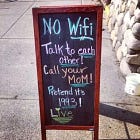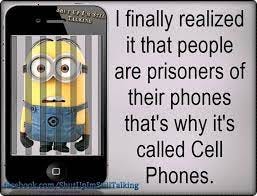Boomers, pt. 4
At the end of part 3, linked below, we were talking about how successful big tech (specifically social media) has been at cornering the global market - and noting how this was allowed to happen without much resistance: for at least a decade (more than enough of a head start, it turned out) these companies were able to operate under the pretense of benevolence, and were more or less infallible.
Even if users had been skeptical (which they weren’t, at all) they’d have had no recourse; it was the wild west: there was no government regulation (compared to today, when there’s… well, still pretty much none, and any that does exist is more than canceled out by massive lobbying efforts), nor had there been any meaningful sociological/scientific research done from which we could draw any helpful conclusions/help inform how we interacted with these products.
On that note, let me wheel back in the Drinks Table Guy (the self-satisfied non-conformist from last time) for a moment. I know he was only a tenuous strawman to begin with, but I think he can still be useful as a comparison given his cause célèbre: the thing is, we really only dislike him because he’s pious - not because we think he’s wrong about alcohol (which he likes to describe as “socially acceptable poison;” “the only drug people judge you for not doing,” etc.). At this point, people largely know the risks of booze, and are usually happy to make the trade-off. Think of Winston Churchill’s “I’ve taken more out of alcohol than it has taken out of me” line. Whether or not we feel like this applies to us is immaterial; the point is that this sort of judgement is possible to make because alcohol’s been studied/around for long enough that it’s a known quantity. The quote could also be co-opted by anyone trying to rationalize the use of any other [recreational] drug. The caveat, of course, is that it’s only valid when referring to consumption that’s moderated/under control. Otherwise, it’s just a way of justifying over-dependence (or flat-out addiction).
…which brings us to big tech: in this case, the Churchill quote doesn’t work, since we don’t actually know what’s really being taking from us, neither at the individual level nor at any broader one. We may have anecdotal evidence (i.e.“I smoked a few cigarettes and didn’t get addicted - what’s the big deal?”), but we don’t really know the trade-off(s) we’re making; what we assume to be “moderate”/harmless usage could prove, once more information comes to light, to be not very moderate at all - even then, a dosage that might have no effect on you could be devastating for someone else.
As things have progressed on the research front, however, we’ve started to get a clearer picture. Spoiler: it’s not good. The studies that have been done thus far have (and I take no pleasure in relaying this) more than confirmed whatever vague skepticism/misgivings/dread I had when I was younger: turns out that the idea that Mr. Zuckerberg was just some socially awkward - but ultimately benevolent - god was a little too optimistic. (Who could have seen it coming!?) I guess it was always going to be too good to be true: any “free service” [that makes the owner a billionaire] that promotes sharing images of yourself and your life (and pits you against other people doing the same thing) was always going to create more issues than it solved.
The stats are especially troubling with regards to children/teenagers: huge increases in depression, anxiety, suicidality, etc. have been tracked [since the advent of Facebook/Instagram] among the younger demographic, with prolonged usage exacerbating all of those symptoms. (Jonathan Haidt’s work on this is really good, but there are a ton of other folks on the case, too.)
But we’ve already covered a bit of this behavioral stuff in the brain-damaged frog posts (the ones brought to us by [longtime friend of the jackuzzi] Al Gore):
What’s depressing - if not particularly surprising - is that it’s also been uncovered that kids are being targeted precisely because of their [the kids’] susceptibility.
Not that Zuck et. al care, but I’m not sure this [the targeting of kids] was necessary, even from their point of view: we’ve already established (with the slot machine stuff in the last post) how easily these companies have converted adults. Old dogs, it’s turned out, weren’t as intransigent as we’d been taught. (Funny, isn’t it? When grandma drops the N-bomb, we “mustn’t judge her - she’s from a different era;” “Don’t bother saying anything, she’s set in her ways.” Fair enough - but she seemed to have no trouble at all figuring out how to pump five grand into her Candy Crush addiction. Let’s make sure we’re not getting played for fools here.)
What I’m saying is that if the older generations could get hooked so easily, their kids and grandkids didn’t have a snowball’s chance in hell - so beseiging them with specially-designed algorithms and advertisements and other proprietary softwares was overkill, in this layman’s opinion.
But, hey, they put a disclaimer up, so their legal bases were covered:
*** STOP ***
Remember, if you are younger than 13, you cannot use this website.
The birthday you entered is too recent… but we’re sure it was just a typo. Why don’t you try again? 😜Ethical concerns notwithstanding, their tactics have been wildly successful: younger and younger children are getting chronically addicted, some before they can even speak - check it out.
In fairness, these guys are by no means the first to prey on youngsters: political/religious institutions have known for a good few millennia that the trick to converting anyone to anything is to get in there (figuratively speaking, of course!) ASAP. If you catch ‘em young enough, you can pretty much mold their beliefs/behaviors into whatever form you want, ensuring they’ll be loyal for life. I could see how this’d be pretty tempting, from a priest’s/marketing department’s perspective.
Although that’s the best comparison we have, I fear it might not work too well as a predictor in this case: historically, it’s taken at least a few decades - if not centuries - for even our most popular drugs/ideologies to catch on, which makes the unprecedented growth we’ve seen with tech all the more impressive (and daunting). On the all-time leaderboard of market capture/number of users, smartphones/social media are already on track for the top spot. No small feat, considering some of the heavyweights they’re competing against, but you’d hesitate to bet against them: not many of the old guard - if any - managed to weasel their way into the hands/brains of 70% of the global population within two decades.
That’s a lot of percents. At the risk of sounding like one of these guys (
) again: the baby video linked above is all fun and games until you realize we are all already that baby: it’s muscle memory to pull out our devices and swipe at every window of opportunity we get; it’s become a Pavlovian response to any hint of boredom, anxiety, fatigue, loneliness, etc.
Just look at anyone (under the age of, say, 65) during any sort of “transition” or lull; while they’re waiting for a train or the bus or the underground, or riding the train or the bus or the underground, or when their friend goes to the bathroom [where they will check their phone] and they have to sit at the table by themselves for a moment. It’s like an extra limb; you panic if you reach for it and it’s not where you thought you’d left it.
If you think any of this sounds kooky, or like an exaggeration, or like fear-mongering, let’s just take a second and ask ourselves what color flag we’d think of if we were to hear that almost every single exec or other high-ranking employee at these social media sites tries to limit their usage of their own products - if they use them at all - and invariably prevent their children from using them altogether. This surely tells us everything we need to know.
For now, though, the bulk of the bell curve [of people who want to consider themselves socially active, politically informed, or technologically “in the loop” are still operating under the aforementioned presumption of [Tech’s] innocence: that these websites/their owners couldn’t possibly have ulterior motives; that cool gadgets and social media are symbols/manifestations of personal success/societal advancement/peak civilization, etc. At worst, it’s something like: “If they do have ulterior motives, I don’t notice them, so it can’t be anything worth worrying about. But thanks for your concern.” (Variations of the Churchill quote, basically.)
I get that we all want to avoid being tarred with the “Boomer” brush, but I have a hunch that throwing in your lot with Zuck&Musk&Co. might not be safe ground/fashionable forever; my suspicion is that the tide has started to turn. There’s no immediate rush, of course; it always takes a while before this sort of shift is registered/internalized by the masses. (It’s like how if you’re not living in a major cosmopolitan hub, fashion lags five, ten, or sometimes 15 years behind. For example, here’s a live look-in at some guy in, like, Oklahoma City:)

It’ll be no different here, especially given how ingrained in our lives these devices and social networks are. But you never know; things can become lame overnight. Floppy discs, transition glasses, etc. You might not be as far from becoming Man-Bun/Skinny-Jeans Guy as you’d think. (Everyone thinks it could never happen to them…) Heavy stuff, I know, but I’m just trying to do the right thing (it’s the jackuzzi™ ethos: Never leave a brain-damaged frog behind). You’re probably fine for another few years, so there’s no need to panic, but I’d start making contingency plans, is all. I couldn’t forgive myself if you ended up like this guy:

Here’s the next post:
Boomers, pt. 5
Last time (linked below) we were talking about how we may be tempted to defend social media/devices/tech corporations so as to inoculate ourselves against allegations of boomerism. If my hunch is correct, though, this “safe bet” might have a shorter shelf-life than it seems. There might come a point in the near future when it’ll actually be considered l…







